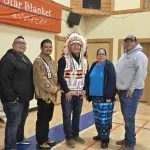
FSIN executive identify issues as new term begins
Saskatchewan chiefs decided to stay the course, re-electing four incumbents to lead the Federation of Sovereign Indigenous Nations (FSIN) and bringing in one newcomer, lawyer Alyson Bear, to fill the vacated position of Third Vice-Chief.
Chief Bobby Cameron, who returns for his third term, is pleased with the Federation’s accomplishment of signing an Internet Online Gaming Agreement with the province, which he says will generate millions and eventually billions of dollars for the 74 member First Nations.
“We have full exclusive rights for five years… This agreement (will put us in) a good solid position in five years. We would pretty much run the online Internet gaming and we want to take this to an international level,” he said.
In 10 to 30 years, “if it’s done rightly… it’ll generate billions of dollars,” Cameron said.
First Nations and the province will split the profits 50-50. The six existing on-reserve casinos pay 25 per cent of profits to the province, something Cameron has long wanted to change.
“We figure in five years we would have a good position to eventually get rid of the 25 per cent or at least bring it down to maybe even five per cent. These are all initial ideas,” he said.
In education, Cameron would like to see Indigenous language immersion programs in schools being funded as well as French immersion, which receives about $22,000 per student per year.
“It should be a no-brainer,” he said. “First Nations face so much inequalities, discrimination and racism in many sectors. Once in a while there’s a shining moment, but those are few and far between right now.”
First Vice Chief David Pratt says now that the Child Welfare Reform Bill C-92 has been passed, many First Nations are working individually and in groups to take control from the Ministry of Social Services. The FSIN will be working to ensure they are adequately funded , he said.
First Nations will generally begin taking jurisdiction of certain aspects of child welfare and ramp up over the years until they have complete control, Pratt said.
“I think they’ll do a better job because they’ll stop traumatizing our kids and moving them all over like cattle, which (the government is) doing right now.
“We’re trying to keep them connected to their communities and rooting them in their culture and identity and support families with their trauma,” he said, noting that Indian Residential Schools led to generations of children and parents traumatized by physical and sexual abuse.
“We’re trying to break that cycle, to build healthy happy homes… Everything that family requires is encompassed within that Child Welfare Reform bill, including supports for the families.”
“(It) is broad and all encompassing,” covering everything needed to protect children, including justice, policing, enforcement, health and education, Pratt said.
The chiefs have been working toward this since the 1980s, he said.
“Everything was based on inherent and Treaty rights. We never gave up jurisdiction over our children. Never. Our children were never on the negotiating table.”
Pratt’s second priority is creation of a health ombudsperson to end discriminatory practices in the health care system. Third, is mental health and addictions services.
“We’re in a mental health and crystal meth crisis,” Pratt said.
The federation is working to obtain “significant investments” to create capacity at the community level, and pushing for more crystal meth treatment beds – too many people are only added to wait lists when they ask for help.
“A lot of our member nations are getting ready to declare states of emergency around crystal meth. We’re losing more people to crystal meth and opioids than we are to COVID,” Pratt said.
Third Vice Chief Alyson Bear is eager to get to work.
“We should be focusing on establishing our own Indigenous policing or peace keepers. We need (more) jurisdiction over our nations,” she said. That could include a legal team of Gladue report writers to ensure courts understand the histories of people they’re sentencing and consider the intergenerational effects of residential schools, she said.
She wants to support Witchekan Lake First Nation, which is taking the Government of Saskatchewan to Federal Court for breaching the Treaty Land Entitlement agreement by auctioning crown lands without giving first right of refusal to First Nations.
Bear also says resource companies should be required to employ more Indigenous people.
Fourth Vice Chief Heather Bear says government needs to stop selling Crown lands for an irrigation project at Lake Diefenbaker without first consulting First Nations about water diversion and sacred sites.
The damage to waters, including the Saskatchewan River delta, should be a concern to settlers too, she said.
She is angered by the trespassing law that she said infringes Treaty and inherent rights.
“To assume we know nothing is insulting and trespassing legislation – total disrespect without consultation and we’ll go to war on that,” she said.
“The day before Treaty this was our land, we lived off the land, our food sovereignty, our culture, everything is rooted in the land. Our Treaties were supposed to be on top of these benefits we already had.”
Provincial employees have taken First Nations hunters’ guns and charged them under provincial laws. They also too often ignore commercial fishers while repeatedly checking Indigenous fishers, she said.
“This is disgusting. It has to stop… At the end of the day, we need to get rid of (the Natural Resources Transfer Act.) That’s the biggest hinderance we have in our region.”
Second Vice Chief Dutch Lerat did not responds to a request for comment.

